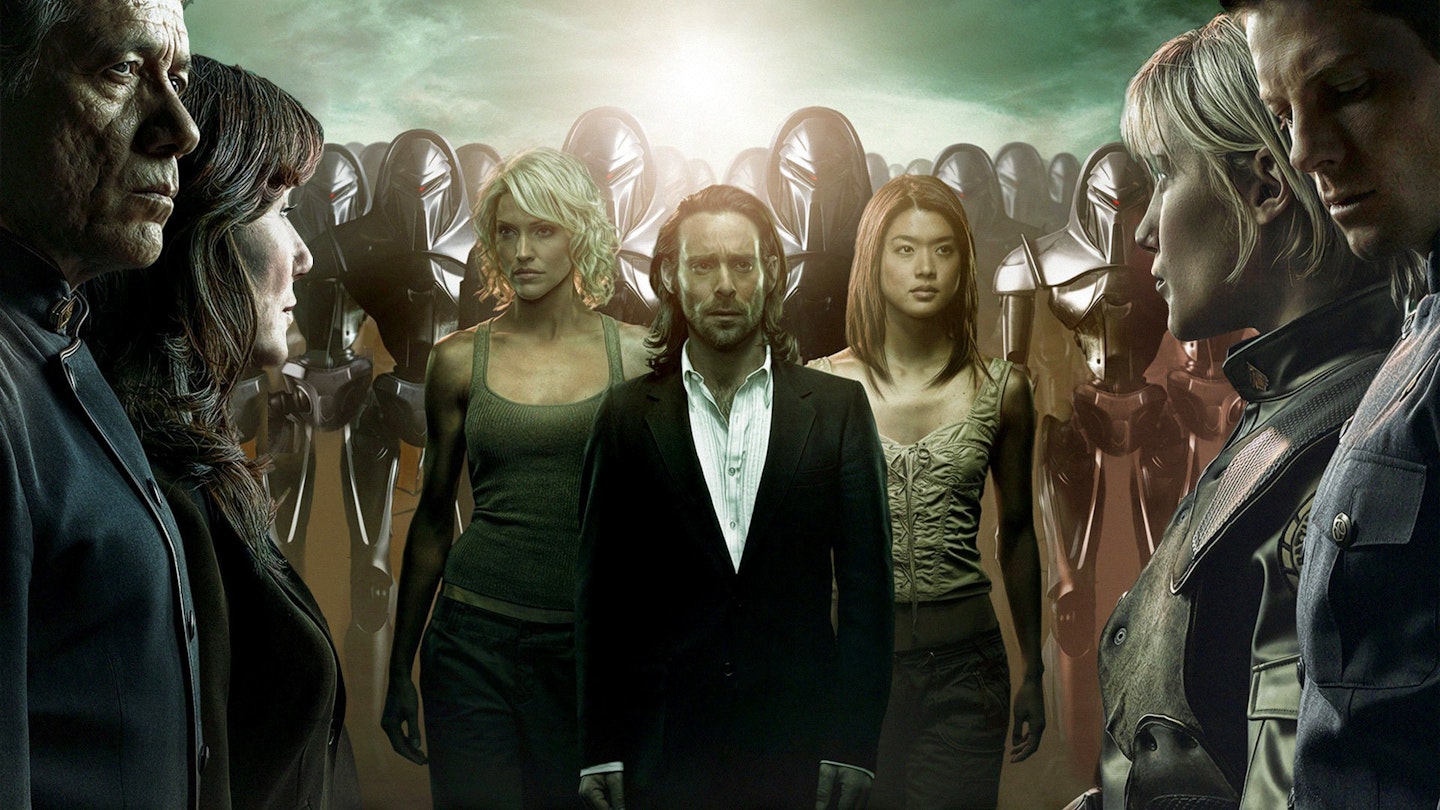Its sci-fi, Jim, but not as we know it. And lets get something straight: its not juvenile sci-fi, its adult allegory. People who sneer that they never watch or read science-fiction are missing some great work, be it speculative, metaphorical or satirical. And Battlestar Galactica is the best character drama that engages the big issues currently on TV. All life is there, its immediacy evident in stories inspired by recent history and current events. Its urgency is heightened by imagining these stories in a setting in which fewer than 50,000 people are left, all under constant threat. This show is about war. Its about genocide. Its about Ugly America. Its about love, hate, power, desire, and being human.
Its still sci-fi enough to offer space battles with spiffy CGI and digital FX, new, improved, scary Cylon centurions and human-looking Cylon infiltrators who are even scarier because they have found a god to kill for. The demands of the concept and futurism see them with faster-than-light space travel, but the humans essentially are stuck with the laws of Newtonian physics. Dramatically it is Shakespearean in its range of human experience and emotion. Melodrama of family, love and personal betrayal mingles with dark, post-9/11 parable, plots rife with socio-political and ethical conflict among characters ranging from leaders, heroes and visionaries to profiteering gangsters, religious extremists and surrender monkeys.
In other words, Ronald D. Moore and David Eicks re-imagined Battlestar Galactica is light-years beyond Glen A. Larsons failed 70s adventure series, which introduced bad robots the Cylons, mindlessly pursuing the remnants of mankind on a biblical, cosmic exodus. Its legacy is in the basic premise: machines made by man evolved, rebelled, and so forth. Its development from that concept made the introductory 2003 mini-series and 2004s 13-episode Season 1 the highest-rated genre show on cable. This even stronger 20-episode second season has been acclaimed by people who seldom dip into genre TV, prompting commitments for at least two more seasons.
Met the ensemble? Edward James Olmos is Galacticas Commander Adama. He has a surviving son with issues, and an executive officer whos a mean drunk with a slutty, scheming wife. Mary McDonnell is the President of the Twelve Colonies, Laura Roslin, a schoolteacher-turned-education minister forced to step up. She has advanced cancer and is embraced by the religious faction as the prophesied dying leader who will lead the people to the legendary, long-lost Thirteenth Colony, Earth. Shes down with that, but will she ban abortion? James Callis is Dr. Gaius Baltar, the craven genius misdirected by the rumble in his trews and a voice in his head into betraying mankind to seductive Cylon Number Six (Tricia Helfer). And there are the fighter pilot Top Guns, led by Adamas increasingly tortured son Lee (Jamie Bamber), Katee Sackhoffs authority-bucking hotshot Kara Starbuck Thrace, and Grace Parks Cylon sleeper, Sharon Boomer Valerii (who has got pregnant with a naively-smitten shipmate. The fate of that unborn child and that forbidden love will run and run).
If Season 1 can be summarised as a fight to survive, the nub of Season 2 is Adamas concern that, Its not enough just to survive. We have to be worthy of surviving. Several key story arcs explore this from different angles. The first part of the season follows scattered characters. Within the refugee fleet in the aftermath of the coup, the Presidents arrest and the assassination bid on Adama by a sleeper agent in the Season 1 finale military and civilians are locked in a power struggle. Back on the Cylon-occupied, nuclear-devastated home world of Caprica, Starbucks quest for an artefact leads her to a human resistance group and horrifying new discoveries about the enemys plan. And down on the rediscovered ancient homeworld of Kobol, birthplace of mankind, a stranded group of crash survivors including Baltar play out a Vietnam War-type of scenario, surrounded by the enemy and several metres short of being on board with their gung-ho officers suicidal strategies in the episode Fragged.
A subsequent arc sees the arrival of Battlestar Pegasus under the command of Michelle Forbes steely Admiral Cain. Relief and joy are short-lived when she takes control of the fleet with a command style that makes Captain Bligh look like Captain Pugwash, introducing a culture of cruelty and abuse of prisoners that sows the seed for catastrophe later in the season. Meanwhile, under the moralists noses, conspiracy, sabotage, black marketeering and sex trafficking flourish. By the time the electrifying season finale is reached with an astonishingly bold stroke, you are indeed questioning whether humans deserve to survive. In every episode the opening credits keep score of the running total of survivors, the loss or, on a rare occasion, the addition of each soul noted. And it matters.
